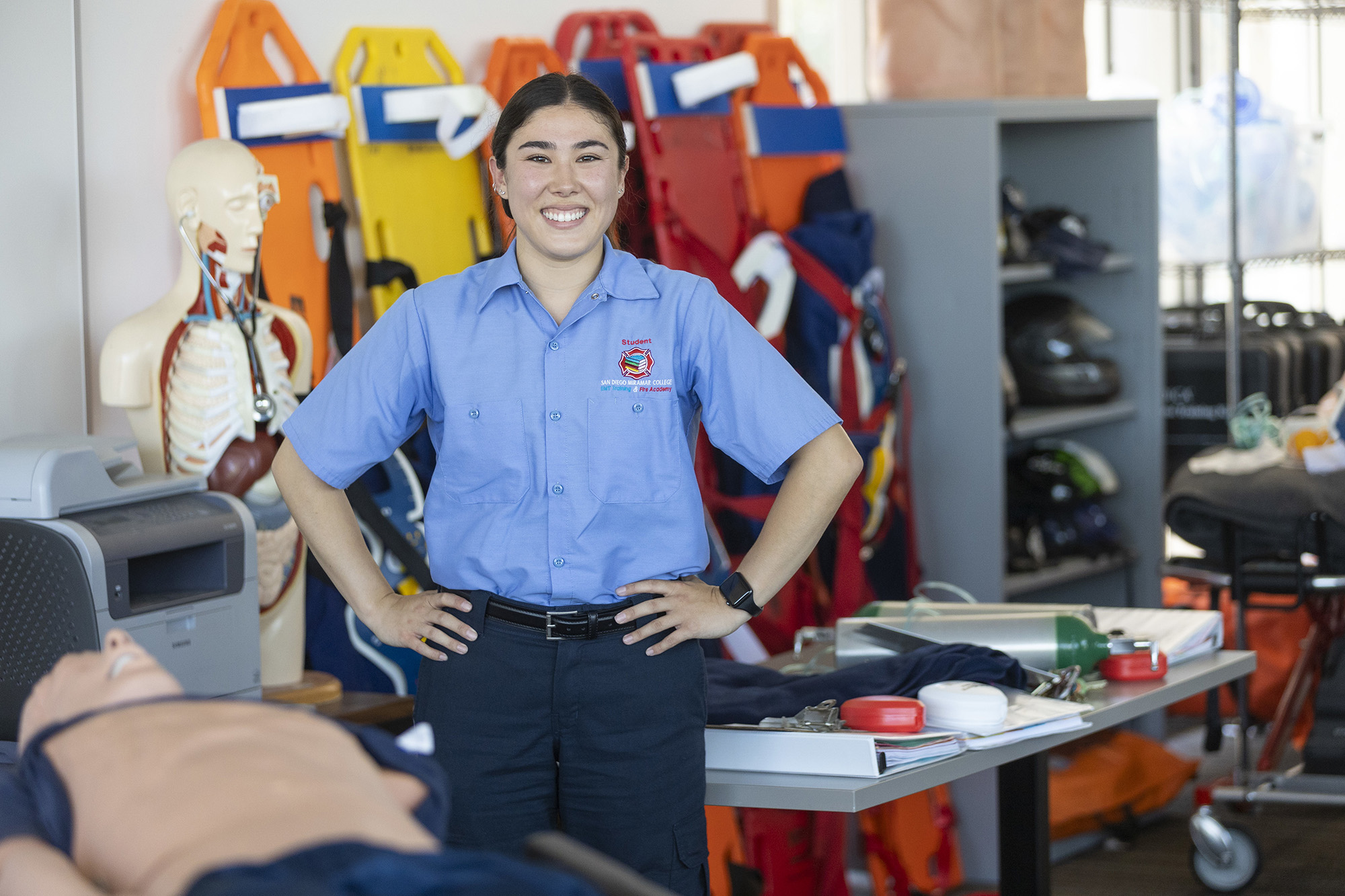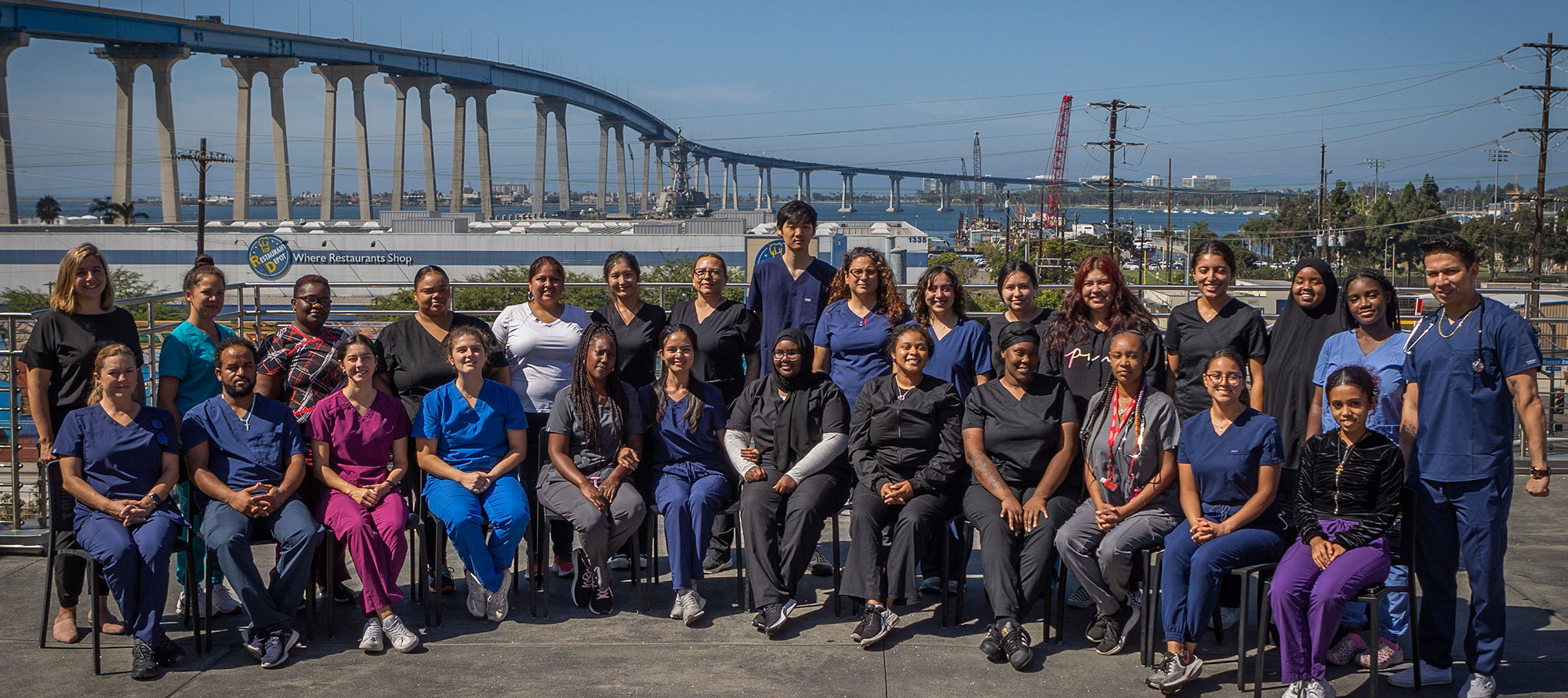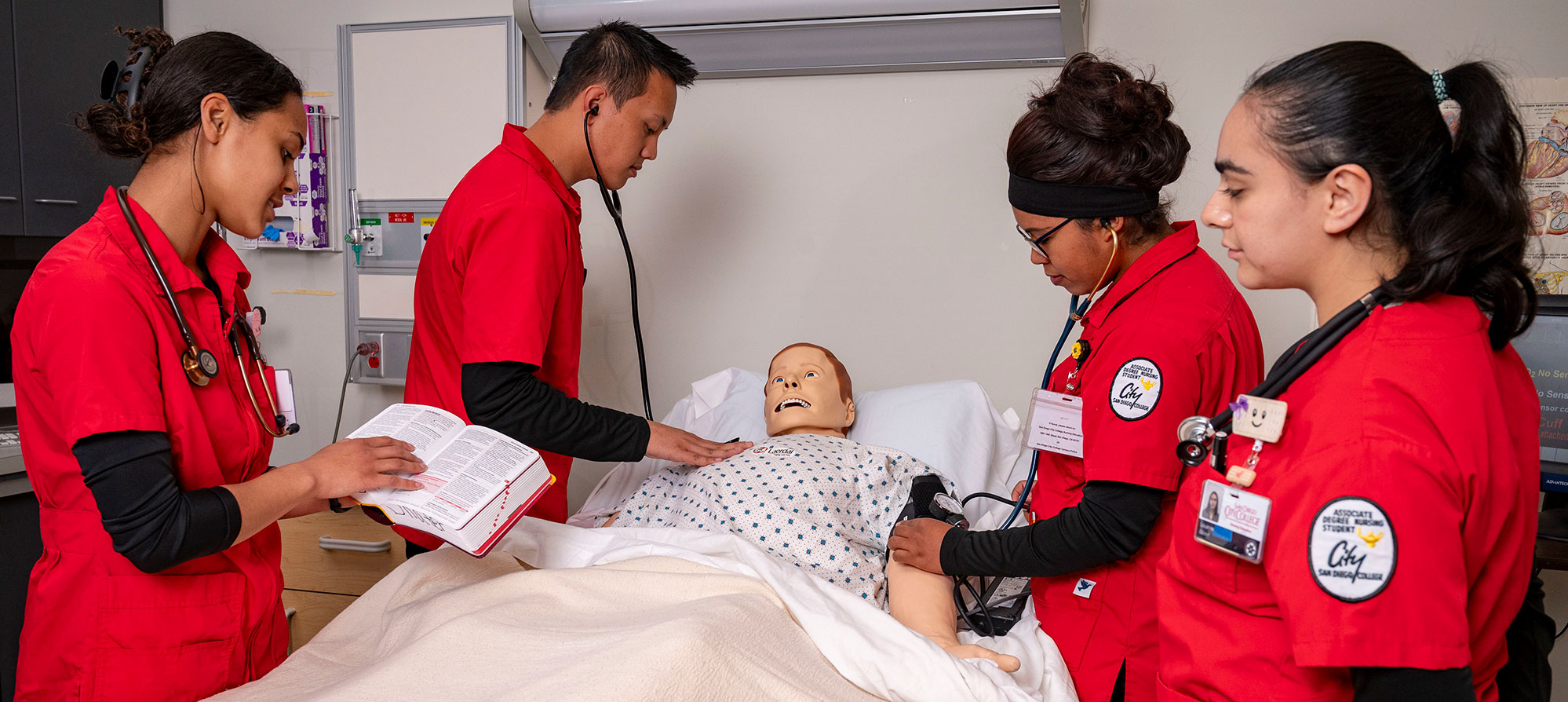Healthcare is San Diego’s second biggest employer, with more than 15,500 jobs added in the private education and health services sector over the past year, state data shows. Nationally, about $1.8 million job openings in healthcare are projected each year to fill new or vacant positions, according to the U.S. Bureau of Labor Statistics.
Yet the healthcare workforce is still predominantly white (53.9%), according to the National Institutes of Health (NIH) Workforce Demographics. In California, Hispanic and Latinx nurses accounted for only 9.6% of California’s active nurses in 2020, and Black/African American nurses represented 4.7% according to the California Board of Registered Nursing: 2020 Survey of Registered Nurses.
The District’s four colleges — San Diego City College, San Diego Mesa College, San Diego Miramar College, and the San Diego College of Continuing Education —are working to change all that.
“From the instructors to the students, we want to change the look of the healthcare industry,” said Cassandra Storey, dean of Health Sciences and Public Service at Mesa College. “The quality and diversity of District graduates align with the goals of the region’s leading healthcare providers.”
Helping students transition seamlessly into the workforce is another goal. Students enrolled in many of the District’s healthcare training programs are required to fulfill clinical hours at Directed Clinical Practice (DCP) health facilities throughout the San Diego region, which can lead to permanent employment.
“Through DCP, students get real-world experience in the field,” said Connie Renda, professor and health education program director at Mesa College. “Once they complete their 135 hours, if a job opens at that health care facility, the employer often hires the student because they have essentially had a three-month long interview and know their work ethic.”
City College
With one of the top nursing schools in the state, City College is helping to address a nursing shortage that grew to near-crisis levels across the country during the COVID-19 pandemic. The college’s associate of science degree in nursing offers students a pathway from licensed vocational nurse to registered nurse, with admission by special application.
City College’s nursing program has achieved significant recognition. It was recently ranked the second-best nursing school in California for the second consecutive year by RegisteredNursing.org, a leading resource for the nursing industry. In 2023, the college was ranked the third-best nursing program in the nation and named the second-best nursing program in the state, according to RN+ Careers.
Upon successfully completing City College’s RN program, graduates are eligible to take the NCLEX-RN (National Council Licensure Examination for Registered Nurses) to begin practicing. In 2022-23, City College graduates had an impressive 100% pass rate.
“This achievement is a testament to the tireless efforts of our nursing faculty members and classified professionals in preparing students for the challenges of the healthcare field, ensuring they emerge as compassionate advocates for patient well-being,” said Dometrives Armstrong, associate dean of Nursing Education at City College and a key leader in the college's efforts to build a more diverse healthcare workforce.
Of the 122 students in the nursing program in fall 2024, 38% are Hispanic/Latinx, 20% are multiracial, 19% are white, and 14% are Asian.
Ashley Watson, who graduated from City College in fall 2023 with her associate degree in registered nursing, said the diversity in the nursing program is important to students like her who want to see change in the industry.
“I’m interested in making sure that my own culture has proper representation within the healthcare setting,” Watson said. “I want to be an advocate for minorities in general, to make sure that we have proper healthcare.”
City College’s nursing program is accredited by the California Board of Registered Nursing and the Accreditation Commission for Education in Nursing (ACEN). The college was the first community college in California to have a joint accreditation review with the two agencies in Fall of 2021, creating a roadmap for other California community colleges.
Mesa College

Mesa College is an innovator in healthcare education as the first California community college to offer a Bachelor of Science Degree in Health Information Management (HIM).
The number of people working in health information management nationwide is projected to grow 16% from 2022 to 2032, much faster than the average for all occupations, according to the most recent figures from the U.S. Bureau of Labor Statistics. The median annual wage for health information technologists and medical registrars was $62,990 in May 2023.
Mesa College launched its HIM bachelor’s degree in 2015, building on a two-year degree in health information technology that has been offered since 1963. The first bachelor’s degrees at Mesa College were awarded in 2018; so far more than 150 students have graduated from the HIM bachelor’s degree program.
“Employers were begging for a program like this to train skilled workers,” said Renda, who authored the college’s HIM baccalaureate curriculum. “The best part is the HIM baccalaureate degree is accessible and affordable. It is only $10,500 for a full four-year degree from an accredited college. Students can also apply for financial aid, scholarships, and exam waivers.”
The degree provided Mesa College alumnus Thu Lam with a rewarding career path.
“I believe that when you have enough knowledge you can work anywhere,” said Lam, who is now a health information management technician at the County of San Diego Department of Health, Epidemiology unit. “Mesa College helped me to have more knowledge and hands-on experience, so that when I got out of the school, I would get a job easier.”
In October 2023, Mesa College was granted provisional approval by the California Community Colleges Chancellor’s Office to offer a bachelor's degree in its Physical Therapist Assistant program. Mesa College already offers an associate of science degree in physical therapy; a bachelor’s degree will give students the ability to enhance their clinical and leadership skills.
“We know that access to affordable and quality education is essential for closing equity gaps, social mobility, and empowering individuals to live their lives of purpose and service," said Mesa College President Ashanti T. Hands. "Offering this baccalaureate ... will not only enhance access for our students but also attract diverse employees to enter the field, address the need for more health professionals, and ensure a workforce that reflects the diversity of our community."
Mesa College also offers the most affordable radiologic technology associate degree in the state, as well as other healthcare degree and certificate programs including dental assisting, dental office administration, medical assisting, neurodiagnostic technology, health information technology, health information management, veterinary technology, physical therapy assistant and phlebotomy.
Miramar College

At Miramar College, students are becoming skilled medical lab technicians through the college’s Medical Laboratory Technology Training degree and certificate program. Coursework emphasizes mathematical and scientific concepts to ensure essential assessment of the health of patients as well as the underlying diagnosis and treatment of diseases.
“Our students are well primed to work in any biotechnological field. They have the foundational knowledge and skill set,” said Milton Lewis, program director.
Due to the rapid demand for skilled medical lab technicians in San Diego, Miramar College students are getting hired before they graduate. Medical lab technicians in the San Diego area earn between $51,491 and $72,381, according to salary.com.
The Miramar College program is approved by the California Department of Public Health Laboratory Field Services and allows recent graduates to become licensed in the state and nationally.
Meanwhile, the college’s Emergency Medical Technician program is building diversity in the workforce through a partnership with American Medical Response (AMR) that’s helping more female cadets become Emergency Medical Technicians (EMT) and paramedics.
“Emergency medical services is historically a male-dominated field,” said Mary Kjartanson, Miramar College’s EMT program director. “Miramar College provides an environment that supports equity and diversity across programs and disciplines. (We are) fortunate to partner with AMR in supporting women in breaching barriers to emergency response pathways.”
To support students facing financial barriers, AMR covers the cost for tuition and books and pays students for the hours they attend class and ride-alongs. Cadets shadow AMR EMTs and paramedics and as they respond to actual emergencies across San Diego County. Upon completion of the academy and passing a national EMT exam cadets are hired by AMR and are eligible for medical, dental, vision and 401K benefits.
A cost-free Pre-Apprenticeship EMT Academy is also being offered through the College of Continuing Education in partnership with the California Firefighter Joint Apprenticeship Committee (Cal-JAC).
Miramar College also offers an associate of science degree in Biology/Allied Health that prepares students and satisfies prerequisites for those entering nursing programs or allied health professions such as physical therapist, dental hygienist, medical technician, physician’s assistant, and optometrist.
College of Continuing Education
The College of Continuing Education offers seven tuition-free healthcare career certificates: Nursing Assistant, Rehabilitative Nursing Assistant, Acute Care Nursing Assistant, Personal Care Assistant/Caregiver, Home Health Aide, Behavioral Home Health Aide, and Health Unit Coordinator.
The programs, which include support for English language learners, “honor the college’s commitment to serve our community, celebrate diversity and to create an enriched workforce,” said Catherine Shafer, acting dean of Healthcare Careers and Community Education.
The tuition-free 16-week CNA program prepares students for the state CNA examination (CCE students have a 98% pass rate), and provides opportunities for clinical rotations at local hospitals and healthcare facilities. Graduates who pass the exam become certified as a nursing assistant by the State of California and can work in rehabilitation and long-term care facilities.
CNA Eric Burke said he was able to get a job quickly after completing the program. “All hospitals require experience .. and more often than not you are competing for only three open CNA positions,” Burke said. “I put six months of clinical experience from the College of Continuing Education on my resume and Sharp accepted that.”
In 2023, the College of Continuing Education launched a new dual enrollment partnership with the San Diego Unified School District, permitting high school students to train as CNAs at the college’s Cesar Chavez Campus. By the time they graduate high school, these students are eligible to become state-certified CNAs and can enter the workforce early or use credits toward a healthcare degree.

